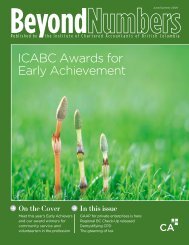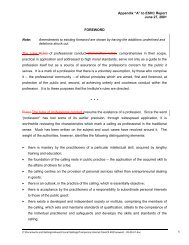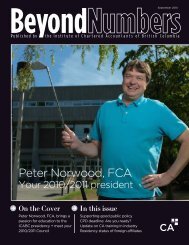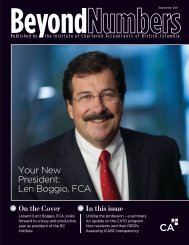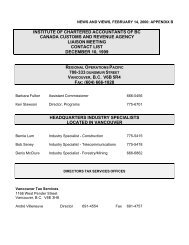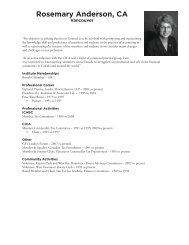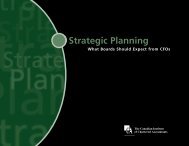Ali Pejman, CA - Institute of Chartered Accountants of BC
Ali Pejman, CA - Institute of Chartered Accountants of BC
Ali Pejman, CA - Institute of Chartered Accountants of BC
Create successful ePaper yourself
Turn your PDF publications into a flip-book with our unique Google optimized e-Paper software.
grasped the importance <strong>of</strong> technological<br />
change for the pr<strong>of</strong>ession and have made it<br />
an integral part <strong>of</strong> the <strong>CA</strong> pr<strong>of</strong>ession.<br />
“I’m glad to see the subject takes up a<br />
lot <strong>of</strong> space on a regular basis in <strong>CA</strong><br />
Magazine,” he says. “For us in public<br />
practice, <strong>of</strong> course it’s important to keep<br />
up-to-date, but it’s also critical for <strong>CA</strong>s who<br />
are CFOs or Controllers and not surrounded<br />
by other <strong>CA</strong>s.<br />
They need the pr<strong>of</strong>ession helping them<br />
understand how technology is continuing to<br />
impact their environments.”<br />
Figner also suggests that while the<br />
big firms have plunged into looking at the<br />
risks and problems associated with<br />
technology, it’s harder for the small or sole<br />
practitioners to do so and thus the <strong>Institute</strong><br />
has a role to play there.<br />
“I think we need mentoring and<br />
intensive pr<strong>of</strong>essional development<br />
around technology and the related issues,”<br />
Figner says. “These are important programs<br />
for all <strong>CA</strong>s.<br />
“<strong>CA</strong>s have always been about information<br />
and integrity,” he says. “Now these<br />
areas have collided with the surge in<br />
information technology and we must<br />
remain on top <strong>of</strong> it.”<br />
Derek Belyea, <strong>CA</strong>, MBA is with<br />
GNA Consulting Group in<br />
Vancouver and, for him, technology has<br />
meant “working harder than ever before.”<br />
“Overall, I see my cycle times for<br />
responding to client requests dropping,”<br />
Belyea says. “I notice that as clients adapt to<br />
new technologies I can add more value to<br />
their businesses with less wasted effort.<br />
That means a lower cost to the client, even<br />
though charge-out rates have been rising.<br />
But I am also juggling more projects at the<br />
same time because the technology allows it.”<br />
Belyea acknowledges that a negative<br />
side effect <strong>of</strong> the changes in technology is<br />
a higher stress level.<br />
“Everyone feels compelled to push<br />
harder and the technology continuously<br />
raises expectation levels,” he points out.<br />
Belyea observes that for most <strong>of</strong> his<br />
clients, technology investments are bigger<br />
than ever and more critical to their<br />
business successes.<br />
“The range <strong>of</strong> choices that is <strong>of</strong>fered is<br />
dizzying and changes daily,” he explains.<br />
“Clients are spending tons <strong>of</strong> money on<br />
technology — Internet, intranets, supply<br />
chain, ERP, CRM, data warehouses and on<br />
and on. They know they have to — just to<br />
keep up — but for many there is an uneasy<br />
feeling that they are not getting it quite<br />
right and not doing it fast enough.<br />
“Failure to get technology projects to<br />
succeed used to be a private matter,”<br />
Belyea continues. “Today everyone is more<br />
savvy about what can be done with<br />
technology and now it can be obvious to<br />
customers, suppliers and competitors that<br />
you are not delivering on technology.<br />
Customers can be fickle if you are not<br />
meeting their expectations and competitors<br />
will pounce when they see an opening.<br />
The businesses that succeed know<br />
how to make technology a competitive<br />
tool. They do this to reduce costs, shorten<br />
cycle times and improve quality. In many<br />
cases, it can mean a complete re-definition<br />
<strong>of</strong> the business.”<br />
Belyea points out that for many<br />
companies the CFO is <strong>of</strong>ten a <strong>CA</strong> with<br />
direct responsibility for technology<br />
investments.<br />
“The CFO needs to understand the<br />
opportunities for technology investments,”<br />
he explains. “He or she also needs to know<br />
how to drive the necessary change into the<br />
business, how to do it on time and within<br />
budget. This can be a tall order with lots <strong>of</strong><br />
risk.” Belyea suggests that the baseline<br />
computer skills most <strong>CA</strong>s have acquired<br />
over the last 20 years will keep on growing.<br />
“If you are not regularly updating<br />
your technology-related competence, it<br />
will show,” he says. “Employers and clients<br />
expect you to be current and are less likely<br />
to trust your judgment in other matters if<br />
you are not reasonably knowledgeable<br />
about technology.<br />
“For <strong>CA</strong>s in decision-making positions,<br />
the challenge is to know the right amount<br />
about technology options,” he explains.<br />
“You need to know the agendas and the<br />
shortcomings <strong>of</strong> the technology experts<br />
who advise you so you’re in a good<br />
position to make the business objectives<br />
drive the technology decisions rather than<br />
the other way around.”<br />
Belyea cautions that while learning<br />
about technology is quite exciting, it can<br />
also be dangerous to “fall in love” with<br />
technology solutions.<br />
“I have seen that happen and it’s<br />
fatal,” he points out. “This is a challenge<br />
that the <strong>CA</strong> pr<strong>of</strong>ession needs to address<br />
overtly. I think there is room for more<br />
education about the business <strong>of</strong> managing<br />
technology and all the related change<br />
management issues.”<br />
Jim McCulloch, <strong>CA</strong>, a tax partner<br />
with the Vancouver firm <strong>of</strong> Rolfe<br />
Benson, <strong>Chartered</strong> <strong>Accountants</strong>, has been<br />
around technology for a long time. A <strong>CA</strong><br />
since 1970, he remembers being “forced”<br />
along with all his tax colleagues into<br />
learning how to use Osborne computers<br />
and a program called “Visicalc”, the original<br />
spreadsheet.<br />
“Today it’s e-filing, totally computerized<br />
tax forms, project modeling and<br />
excellent tax research resources on the<br />
‘net or CD ROM updates,” he says. “It’s<br />
been a remarkable 20 years.”<br />
McCulloch himself has been ‘wired’ at<br />
both home and <strong>of</strong>fice for at least 15 years<br />
and relies heavily on his Lotus organizer.<br />
He carries a cell phone, but no laptop — at<br />
least not yet.<br />
“For clients, technology has meant so<br />
many improvements, it’s just marvelous,”<br />
he explains. “The computerization <strong>of</strong> all<br />
aspects <strong>of</strong> accounting — for example, the<br />
paperless audit and fully integrated<br />
systems — have improved operations and<br />
reporting immeasurably. And <strong>of</strong> course e-<br />
commerce will be a big market in the near<br />
future, though it means issues <strong>of</strong> security<br />
and privacy, too.”<br />
McCulloch admits there are some<br />
clients — and even some staff — who are<br />
resistant to technology, but “those<br />
numbers are small and dwindling all the<br />
time”.<br />
“I know it can be a long, slow process<br />
for some older <strong>CA</strong>s, especially when every<br />
<strong>CA</strong> student or young <strong>CA</strong> who comes<br />
through the door is so keen on all aspects<br />
<strong>of</strong> technology, but you have to embrace it,”<br />
McCulloch says. “<strong>CA</strong>s must go for all the<br />
technological knowledge they can acquire<br />
and always be on the leading edge. Clients<br />
and employers expect it, demand it.”<br />
Right now, McCulloch says he’s<br />
working with voice-recognition s<strong>of</strong>tware<br />
for dictation (“it’s not quite there yet”) and<br />
he’s convinced we’ll all have personal<br />
information managers soon.<br />
Travis Bryson, <strong>CA</strong>, “unplugs”when<br />
he’s at home. “I haven’t let technology<br />
grab too much <strong>of</strong> my life at home,”<br />
Bryson says. “There’s no cell, no laptop and<br />
no pager there. At work, it’s another story.<br />
There I’m totally plugged in.”<br />
Bryson, a <strong>CA</strong> since 1996, is the<br />
Manager <strong>of</strong> Business and<br />
Technology Solutions at<br />
BDO Dunwoody LLP in<br />
Vancouver. He says he<br />
remembers his first<br />
encounters with 286<br />
computers during his<br />
articling days in the early<br />
‘90s. [cont’d on page 24]<br />
10 Beyond Numbers / September 2000



